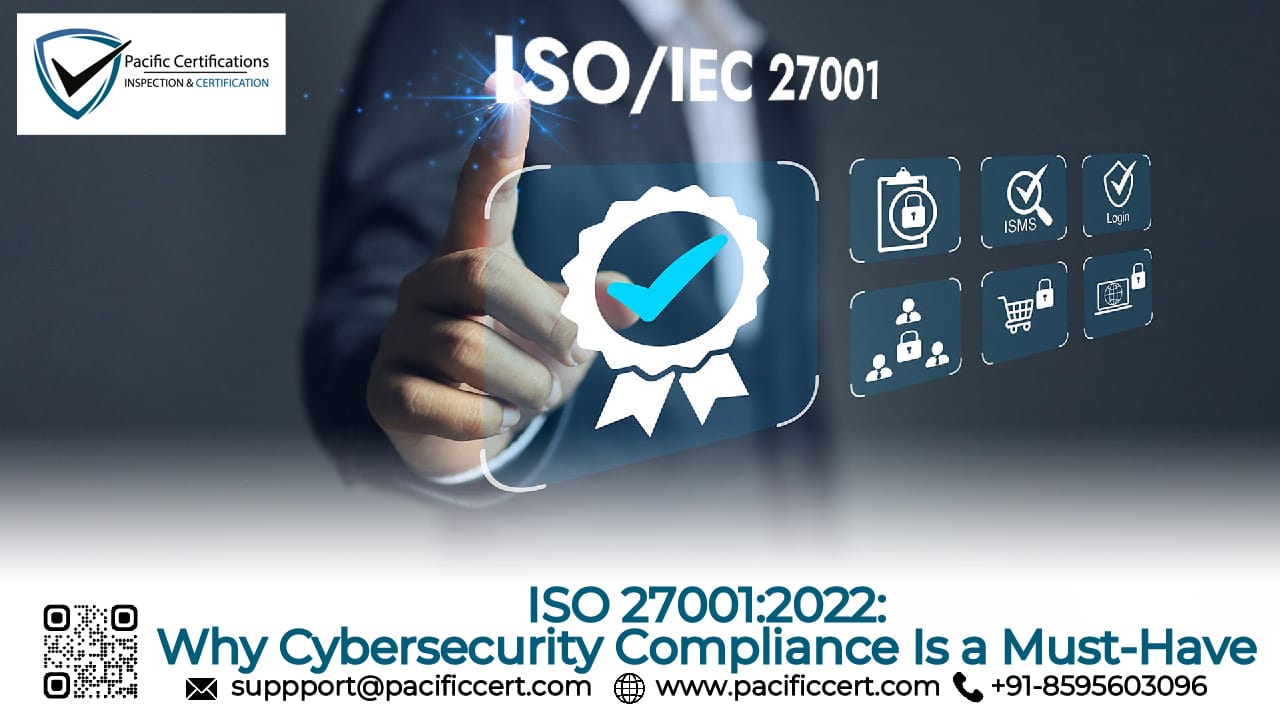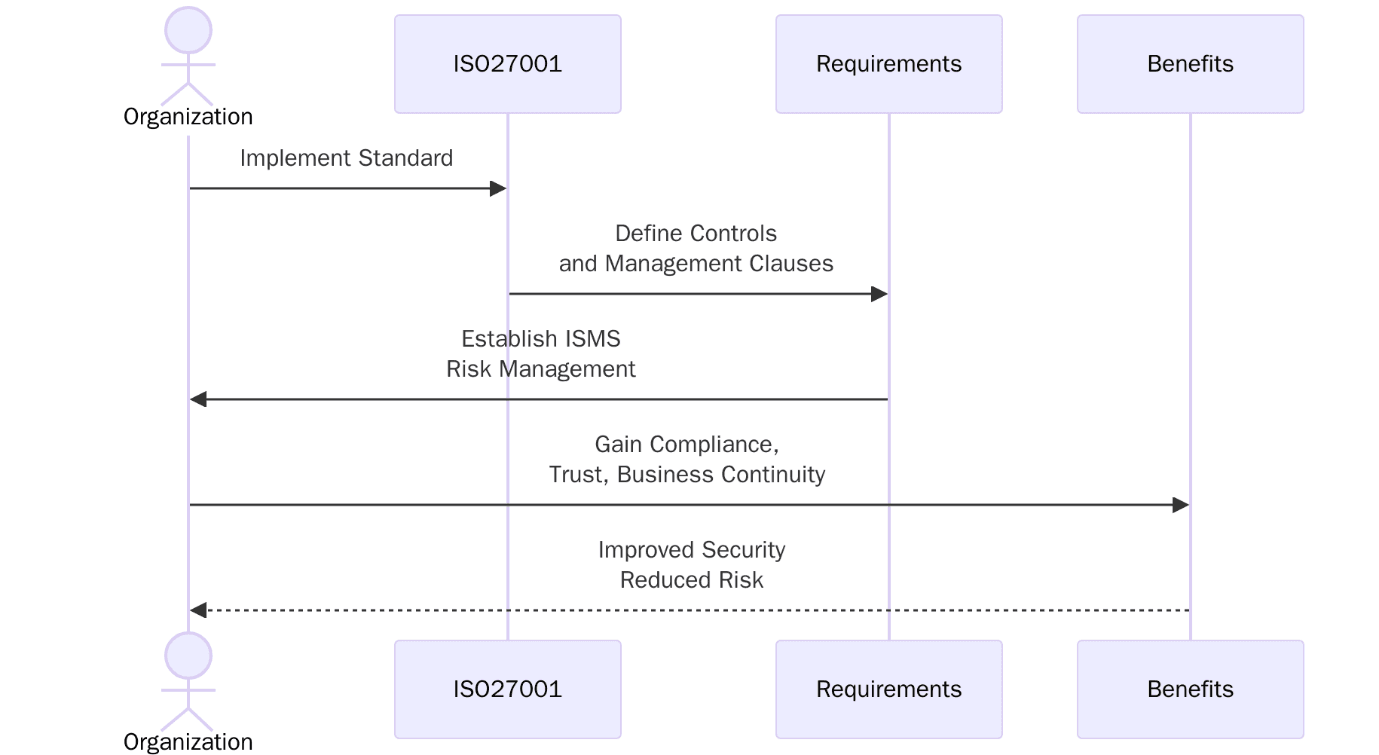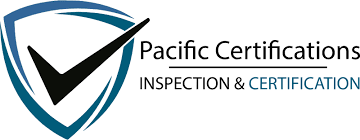ISO 27001:2022: Why Cybersecurity Compliance Is a Must-Have?

In the age of digital connectivity, cybersecurity has evolved from a technical necessity to a strategic imperative. With data breaches, ransomware attacks, and regulatory scrutiny becoming increasingly common, organizations cannot afford to take information security lightly. ISO/IEC 27001:2022—the international standard for Information Security Management Systems (ISMS)—has emerged as the gold standard for managing data security and building stakeholder trust.
This article explores why ISO 27001 compliance is essential, for businesses operating in today’s threat landscape and related standards like ISO/IEC 27002, 27005, and 27701, offering a holistic view of cybersecurity governance and why your organization should act now.

Need ISO 27001 certification support? Reach out to our team at [email protected]
The Growing Relevance of ISO 27001 in a Digitally Transformed World
As enterprises expand digitally, they expose themselves to evolving cyber threats, ranging from phishing attacks and insider breaches to sophisticated zero-day vulnerabilities. The traditional perimeter-based security models are no longer sufficient. A structured, risk-based approach is required to ensure end-to-end security management.
ISO/IEC 27001, developed by the International Organization for Standardization (ISO) and the International Electrotechnical Commission (IEC), is the cornerstone of such an approach. It offers a comprehensive, process-based framework to establish, implement, maintain, and improve an ISMS—tailored to the needs and risks of any organization, irrespective of its size or sector.
What Does ISO/IEC 27001 Require?
Implementing ISO 27001 mandates a cultural shift towards proactive security management. The standard is based on a continuous improvement cycle, Plan, Do, Check, Act (PDCA)—and outlines the following core requirements:

- Context of the Organization – Understanding internal and external issues, stakeholders, and information assets.
- Leadership Commitment – Management must establish an information security policy and demonstrate accountability.
- Risk Assessment and Treatment – Organizations are required to identify potential security risks, evaluate their impact, and implement mitigation strategies.
- Security Controls (Annex A) – ISO 27001 includes a reference to 93 controls grouped into four themes: organizational, people, physical, and technological.
- Internal Audit and Continuous Improvement – Regular monitoring, reviewing, and improving the ISMS to ensure long-term effectiveness.
The latest version of ISO/IEC 27001:2022 aligns more closely with modern security demands by revising control categories and enhancing compatibility with other standards.
For ISO 27001 audit and certification services, connect with us at [email protected].
Benefits of ISO 27001 Certification: Why It’s Worth the Investment
Adopting ISO 27001 is not just about compliance; it's a strategic decision that delivers tangible and long-term value. Key benefits include:

- By identifying and addressing vulnerabilities, organizations reduce their exposure to breaches and operational disruptions.
- Certification signals to clients and stakeholders that your organization takes data security seriously, often becoming a prerequisite for doing business.
- ISO 27001 helps organizations comply with regulations such as GDPR, HIPAA, and national cybersecurity laws by implementing appropriate security measures and controls.
- Establishing defined processes and responsibilities reduces inefficiencies, fosters accountability, and improves overall governance.
- The ISMS ensures better readiness to detect, respond to, and recover from incidents, reducing damage and recovery time.
- In tendering processes and global partnerships, ISO 27001 certification often serves as a key differentiator.
ISO 27001 and Related Standards
ISO 27001 provides the structural foundation for an ISMS, it’s part of a broader suite of standards that together deliver a robust information security framework. Understanding these interrelated standards can amplify your security maturity:
ISO/IEC 27002:2022 – Code of Practice for Information Security Controls
This is a detailed guide that supports ISO 27001 by providing best practices and implementation guidance for each control listed in Annex A. The 2022 revision streamlines controls into four categories (organizational, people, physical, and technological) and introduces key attributes such as cybersecurity concepts, operational capabilities, and security domains.
ISO/IEC 27005 – Information Security Risk Management
27005 provides a comprehensive methodology for risk management within the context of ISO 27001. It outlines how to identify, assess, and treat information security risks based on the organization’s risk appetite.
ISO/IEC 27701 – Privacy Information Management System (PIMS)
Built as an extension to ISO 27001 and 27002, ISO 27701 addresses data privacy and personal information protection. It’s highly relevant for organizations managing personally identifiable information (PII), especially under regulations like the GDPR.
ISO/IEC 27017 and 27018 – Cloud Security and Privacy
For organizations that rely heavily on cloud services, these standards provide specific controls for cloud security (27017) and privacy protection in cloud environments (27018).
Get expert guidance on ISO 27001 compliance. Email us at[email protected].
Why ISO 27001 is Surging Globally?
The global landscape for cybersecurity compliance has been fundamentally altered by rising data protection concerns, sophisticated cybercrime, and tightening regulatory mandates. The ISO 27001 certification market is expanding rapidly, driven by demand in industries like healthcare, finance, telecom, IT services, and public infrastructure.
According to recent market intelligence:
- The global ISO 27001 Certification market is expected to surpass USD 56 billion by 2033, growing at a CAGR of over 15%.
- Europe and North America remain the largest markets due to GDPR, CCPA, and HIPAA enforcement, while Asia-Pacific is emerging fast due to digital expansion and cross-border data flows.
- Small and Medium Enterprises (SMEs) are increasingly adopting ISO 27001 to compete globally and enter supply chains of larger corporations.
With third-party risk management becoming a critical area of concern, companies are increasingly demanding their suppliers and service providers to be ISO 27001 certified, further fueling adoption.
Who Should Consider ISO 27001?
While often associated with large organizations or IT firms, ISO 27001 is applicable to any organization that handles sensitive data—regardless of size or sector. Companies in the following domains find immense value:
- Healthcare (protecting patient records and complying with HIPAA)
- Banking and Fintech (data integrity, regulatory compliance, fraud prevention)
- Software and SaaS Providers (customer data protection, supply chain compliance)
- Manufacturing and Supply Chain (protecting proprietary information and ensuring business continuity)
- Public Sector and Defense (cyber resilience, critical infrastructure protection)
- Legal and Consulting Firms (confidentiality of client information)
Even startups and SMEs aiming to attract international clients or enter regulated markets can benefit significantly from ISO 27001 certification.
Secure your organization with ISO 27001. Write to us at [email protected].
Challenges in Achieving ISO 27001 Certification
Despite its benefits, implementing ISO 27001:2022 requires strategic planning, time, and resources. Common challenges include:
- Resource Constraints: Smaller organizations may find it difficult to allocate budget and personnel for implementation and ongoing maintenance.
- Cultural Resistance: Changing organizational behavior around data handling and privacy often faces internal pushback.
- Complex Documentation: Establishing the required policies, risk registers, asset inventories, and audit mechanisms demands precision and consistency.
- Technology Integration: Aligning the ISMS with existing IT infrastructure and tools, especially in hybrid or legacy environments, can be technically challenging.
However, with the right implementation partners and internal champions, these obstacles can be overcome. A phased, risk-based approach often ensures better success.
ISO 27001 in the Post-Pandemic, AI-Driven Era
The global shift to remote work, accelerated digital adoption, and rising reliance on AI and automation has drastically increased the attack surface for businesses. ISO 27001 is all about ensuring business continuity and stakeholder assurance in this new era.
Moreover, the integration of AI and machine learning in cybersecurity operations further enhances threat detection and response. But these technologies must be governed by robust ISMS frameworks to ensure ethical use, data protection, and transparency.
Similarly, with the explosion of data generated through IoT and edge devices, ISO 27001 acts as a blueprint to manage, secure, and govern data across complex and distributed architectures.
The Strategic Imperative of Cybersecurity Compliance
Cybersecurity is not merely an IT issue—it’s a business issue. In today's world, data is a critical asset, and its protection must be integrated into the fabric of organizational strategy. ISO/IEC 27001 provides a globally accepted framework that empowers organizations to protect information systematically, respond to evolving threats, and build trust across all stakeholder groups.
By pursuing ISO 27001:2022 and its related standards, organizations not only comply with best practices but also demonstrate a culture of resilience, professionalism, and transparency.
Whether you're a startup looking to enter new markets or a large enterprise securing complex data systems, ISO 27001 is a must-have.
For organizations seeking support in achieving ISO 27001 certification, Pacific Certifications offers audit and certification services accredited by ABIS. Our expert auditors ensure that your ISMS meets global benchmarks and supports your business growth with confidence and credibility.
For more information or to get started, contact us at
📧 [email protected]
🌐 www.pacificcert.com
Ready to get ISO certified?
Contact Pacific Certifications to begin your certification journey today!
Suggested Certifications –
Read more: Pacific Blogs

